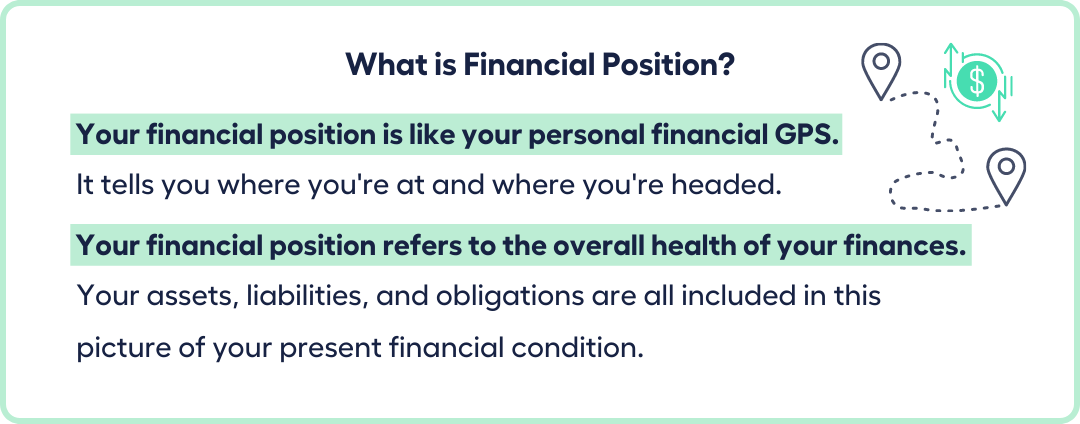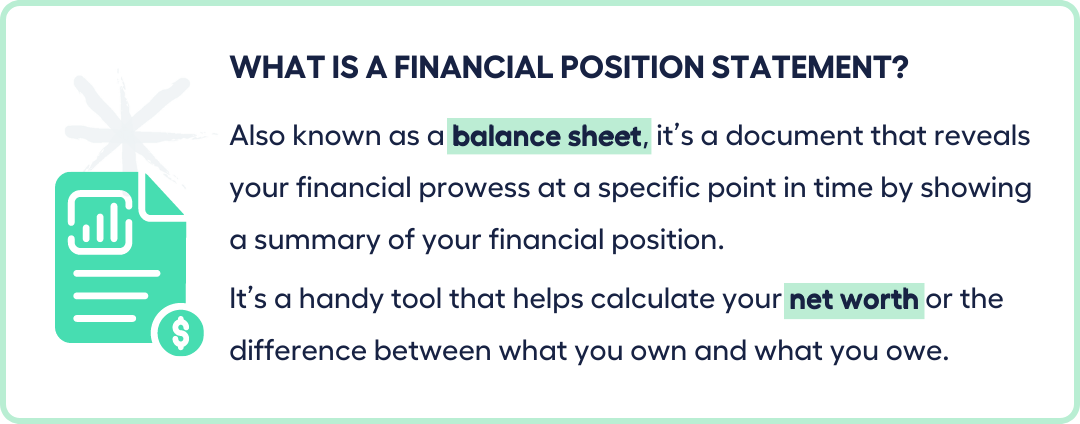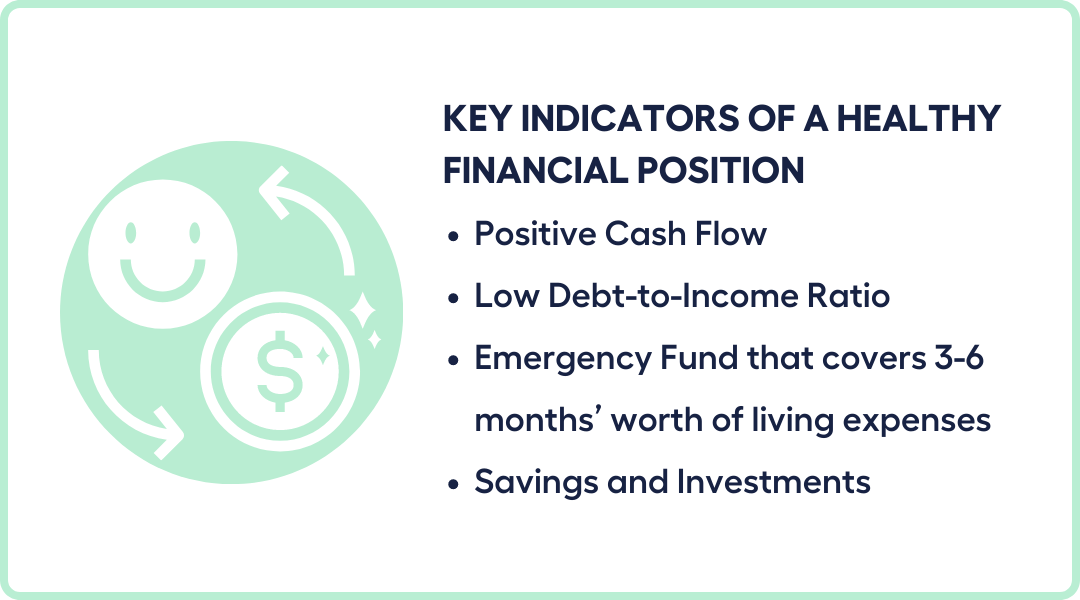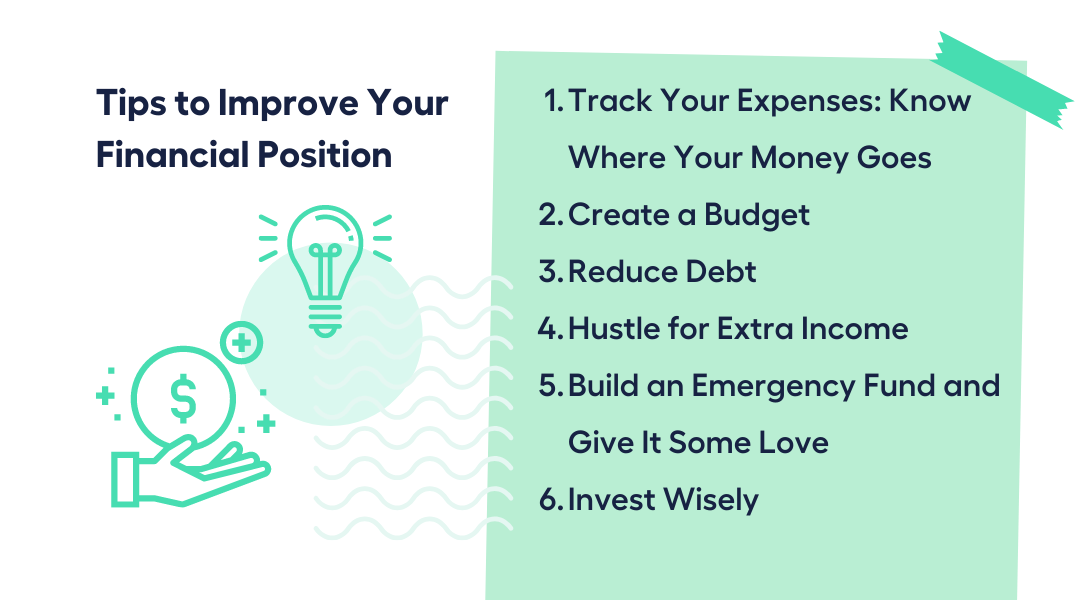Hey money-savvy folks!
Are you thinking of getting your financial ducks in a row with a clear financial position?
Whether you’re an individual or a business owner, we know that managing our finances is as important as getting our daily dose of caffeine.

Imagine this:
You’re sitting on your porch, enjoying a cuppa, and suddenly, a wave of financial confidence washes over you. You are fully aware of your financial situation, how to make your hard-earned money work for you, and how to handle any unforeseen financial setbacks.
Sounds like an impossible dream?
Well, it’s time to understand your financial position, so you can wave goodbye to money stress and say hello to financial peace of mind.
In this article, we will explore the definition of financial position and how to identify and analyse your own financial position.
Jump straight to…
Financial Position Definition
Alright, let’s break it down.
Your financial position is like your personal financial GPS. It tells you where you’re at and where you’re headed. Whether you’re a paycheck-to-paycheck warrior or a business tycoon, understanding your financial position is crucial to rock your money goals and avoid any financial detours.
Your financial position refers to the overall health of your finances. Your assets, liabilities, and obligations are all included in this picture of your present financial condition. You can evaluate your capacity to fulfil financial responsibilities and reach your financial objectives by being aware of your financial health.

Identifying Your Financial Position
So, How Do You Figure Out Your Financial Position?
First things first, let’s unravel the mysteries of your financial position. It’s like putting together the pieces of a jigsaw puzzle, but don’t worry, it’s easier than it sounds.
Here are the key factors to consider:
Cash Flow
Think of cash flow as the lifeblood of your financial existence. It’s all about tracking the money flowing in and out of your accounts to make sure that cash flows.
Are you swimming in a sea of cash or barely keeping your head above water?
Positive cash flow means you have more money coming in than going out of your accounts, while negative cash flow indicates the opposite.
By keeping an eye on your cash flow, you can spot areas where you can reduce expenses, make more money, or set aside funds to achieve your financial goals.
Current Assets
Current assets are your financial superheroes that can be quickly transformed into cash within a year. They include things like cash on hand (yep, that cash in your wallet), savings, investments, and even that money your friend borrowed but hasn’t paid back yet (aka accounts receivable). Calculating your current assets gives you the inside scoop on the money you have at your fingertips (or what is referred to as liquidity).
Current Liabilities
Now, let’s talk about the financial monsters lurking in the shadows:
Current liabilities.
These are the debts or bills that you need to pay within a year. They could be sneaky credit card bills, utility payments, or those buy-now-pay-later accounts. Knowing your current liabilities helps you stay on top of your financial obligations and understand the urgency of debt repayments so you can tackle them head-on.
Current Debt
Ah, debt. The dirty D-word that no one likes to talk about. But hey, we’re all about facing our financial fears here.
Current debt specifically refers to the portion of your total debt that needs to be paid within a year. It could be that lingering credit card balance, in-store financing, or that personal loan you’ve been itching to get rid of. By understanding your current debt, you can start strategising your repayment plan and show debt who’s boss by making informed decisions about managing your debt obligations.
What is a Financial Position Statement?
Think of this as your financial superhero cape. Your financial position statement, also known as a balance sheet, is a document that reveals your financial prowess at a specific point in time by showing a summary of your financial position.
It showcases your assets, liabilities, and equity. This handy tool helps you calculate your net worth, which is the difference between what you own and what you owe. It’s a valuable tool for monitoring your financial progress over time.

What is a Healthy Financial Position?
A healthy financial position is like having a solid foundation for your financial house. It means being in a stable and secure state where you have control over your finances and can handle unexpected expenses without breaking a sweat.
Here are a few key indicators of a healthy financial position:
1. Positive Cash Flow
Having a positive cash flow means that you’re earning more money than you’re spending. It enables you to pay your bills, put money away for the future, and even invest in opportunities to increase your wealth.
2. Low Debt-to-Income Ratio
Your debt-to-income ratio is a measure of how much debt you have compared to your income. A healthy financial position usually means having a low debt-to-income ratio that won’t give you nightmares. You’re not drowning in debt; you’re in control and making progress towards being debt-free.
3. Emergency Fund
An emergency fund is like your secret weapon. It’s a stash of money set aside for unexpected expenses like medical bills or car repairs. A healthy financial position includes having an emergency fund that can cover at least three to six months’ worth of living expenses.
4. Savings and Investments
A healthy financial position means you’re not just living paycheck to paycheck. You’re building up savings and investments, like a true money master. You’re setting aside money for your future goals, whether it’s a dream holiday, a house deposit, an education fund for your children, or a comfortable retirement.

How Can I Improve My Financial Position?
Improving your financial position is like giving your financial health a boost. It may take time and effort, but the rewards are well worth it.
If you’re keen to take your financial position from good to great, here’s what you can do:
1. Track Your Expenses: Know Where Your Money Goes
Start by tracking your spending like a hawk. Get a handle on where your hard-earned cash is going and identify areas where you can cut back. Look for any unnecessary spending and find ways to reduce expenses without sacrificing your quality of life. Those daily lattes? Maybe it’s time to bring the coffee machine out from the back of the kitchen cupboard and pocket the savings.
2. Create a Budget
Creating a budget is your ticket to financial success. It’s like choreographing your money moves. Allocate your income to different categories, like bills, savings, and splurges. Stick to your budget and watch your financial position improve.
3. Reduce Debt
Say goodbye to debt like a boss. Focus on paying off your high-interest debts first while making minimum payments on the rest. Look into strategies like debt consolidation or negotiating better interest rates. You’ve got this!
4. Hustle for Extra Income
It’s time to unleash your inner hustler. Look for opportunities to boost your earnings, such as taking on a side gig, freelancing, or investing in your skills to advance in your career. The extra income can help you pay off debt faster and save more for the future.
5. Build an Emergency Fund and Give It Some Love
Build up that emergency fund like it’s your financial BFF. Set aside a portion of your income each month until you’ve got a buffer of three to six months’ worth of living expenses. Having this buffer will provide peace of mind and protect you from financial shocks.
6. Invest Wisely
Once you’ve built a solid financial foundation, it’s time to put your money to work and watch it grow. But hold your horses, we’re not talking about throwing your hard-earned cash at every shiny investment that comes your way. We’re talking about investing wisely.
You can dip your toes into the stock market, dabble in bonds, or even take a leap into real estate. The key is to create a diversified portfolio of investments that align with your risk tolerance and financial goals. Do your research, seek advice if needed, and make informed decisions that suit your unique circumstances.

Remember, improving your financial position takes time and dedication. It’s not an overnight fix, but a journey towards financial freedom. Stay disciplined, stay focused, and keep making smart financial choices. Start small, invest wisely, and watch your wealth grow.
Need to Get Your Money Sorted? Find the Right Finance Expert Who Can Guide You by Booking a FREE 15 min Call or Send Us Your Questions!






